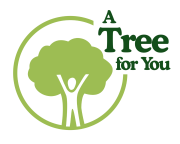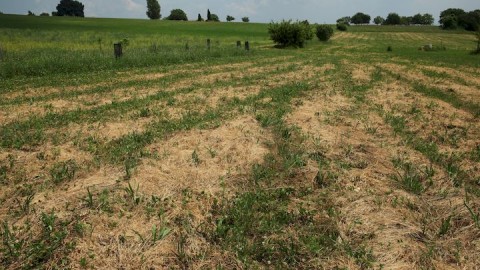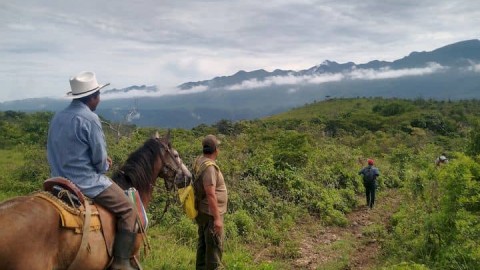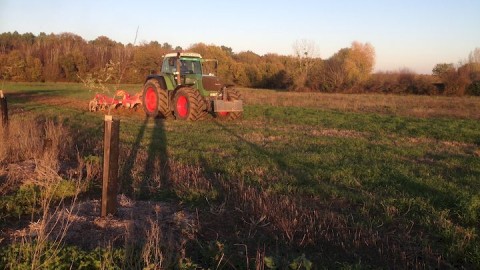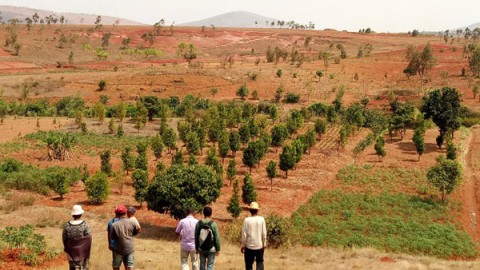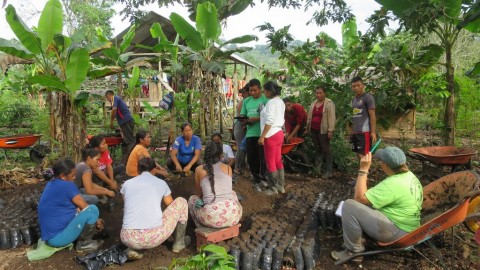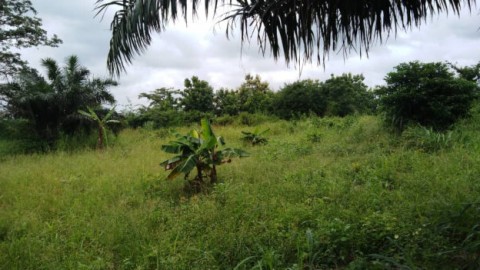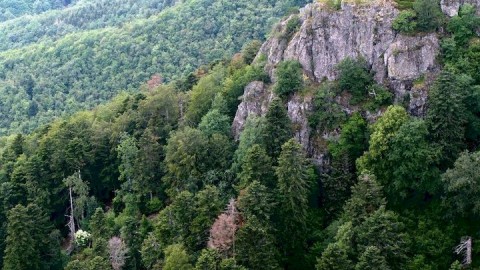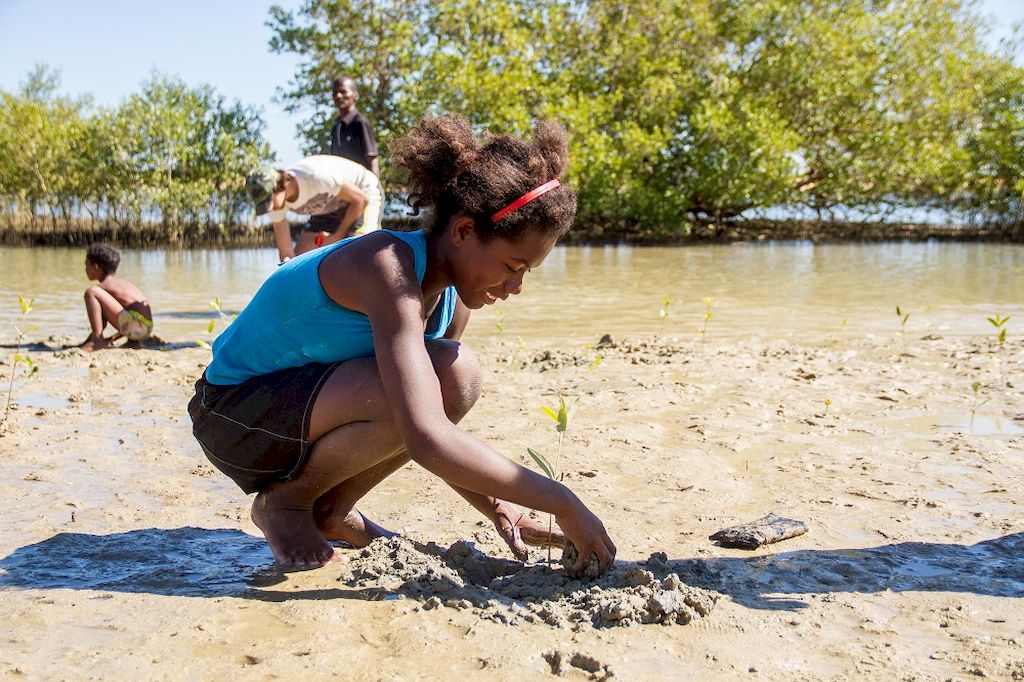
Background & challenges
The project is located between the villages of Tsongeritelo and Ambotsibotsiky, in the Atsimo Andrefana region southwest of the island. This region is famous for its mangroves, growing along the shores of the Mozambique Channel (Indian Ocean).
The local inhabitants are originally from the Vezo, a semi-nomadic ethnic group with close ties to the sea. Generations of these people have lived in harmony with the ocean, lagoons, and mangroves. Nowadays, the population lives mainly off sea and coastal fishing, as well as agriculture – growing sweet potatoes and producing salt – are their main activity.
Unfortunately, climate change, massive deforestation and destruction of the mangroves, population growth, and industrial offshore fisheries have greatly disrupted this way of life. Ninety percent of people in the region live below the poverty line, suffer from food insecurity, and are therefore extremely vulnerable to climate change.
Mangroves are vital for local populations, providing them with food, firewood and building materials for their houses. They also have medicinal properties.
One of the priorities of the project is to boost the management and restoration of degraded natural resources, as well as the ability of households in the region to adapt to climate change for food and food security.
Hence the project aims to plant 7,200 mangrove trees with the active involvement of 400 students from surrounding schools.
This project is being run through a twinning with the educational project in France to restore damaged stands in the communal forest of Wegscheid. The French and Malagasy pupils will exchange writing, photos and drawings to discover each other and the different environments.
The educational aspect this project will enable the children, by planting their own tree, to:
- discover the richness of the forest and mangroves and reconnect with nature;
- act in the public interest by making a long-term gesture that is free for themselves, for others and generations;
- participate in international solidarity by discovering forests around the world and exchanging with schoolchildren in France (the Vosges) who, like them, are replanting trees on their home territory.
For the environment, planting the trees will deliver the following benefits:
- tackle erosion and preserve water resources;
- enrich biodiversity and increase the presence of fish and shellfish near the mangroves;
- tackle poverty and food insecurity;
- directly tackle global warming by capturing carbon and planting adapted species.
Project type

Educational mangrove planting
Beneficiaries

Schools in the district of Tuléar I & II: 400 pupils, 8 teachers, 1,600 parents and families of the young participants, 10 elected officials and local authorities involved in the project, 5,000 village communities neighbouring the plantation areas.
Number of trees

8 000 trees planted to retain 7 200
Species planted

Orange mangrove, Bruguiera gymnorhiza; red mangrove, Rhizophora mucronata; yellow mangrove, Ceriops tagal; grey mangrove, Avicennia marina; flower mangrove, Sonneratia alba
Partner

Eau de Coco and Kinomé
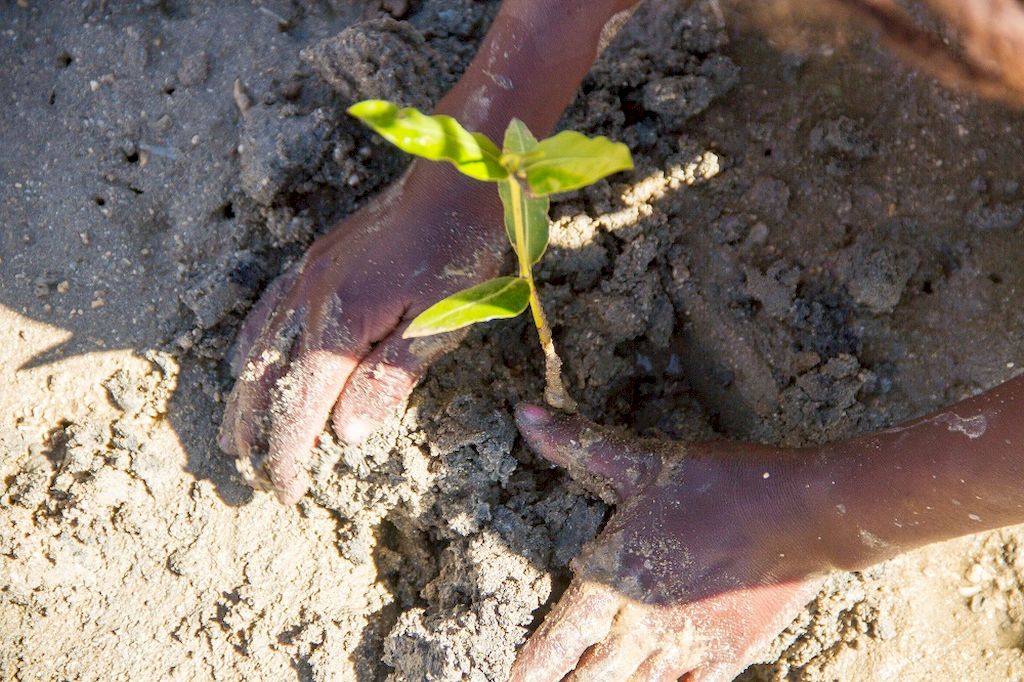
Works timeline
Organised by planting year. For this project, two planting years are planned.
This project will be carried out in conjunction with the educational project to restore damaged stands in the communal forest of Wegscheid, run by the French forestry office (Office National des Forêts).
Period 1: October – November 2021
- Eau de Coco to select partner classes, plus first workshop on the forests and project
- Selecting eco-system plots (mangrove…)
- Preparing seedlings and transplanting mangrove seedlings
Period 2: November – December 2021
- Preparing reforestation plots
- Educational planting of 3,100 mangrove trees (with students)
- Awarding the children with planting certificates
- Presenting the project and remote training by Canopé for teachers in how to use the digital platform
Period 3: January – April 2022
- Discovering the world’s forests in class (including Wegscheid forest), and the threats to forests in Madagascar
- The Malagasy children to present their actions
- Sending support material to the corresponding classes in France
- Preparation and discussions by video conference with the corresponding pupils in France
- Preparing seeds and seedlings, transplanting mangrove seedlings for the second planting session
Period 4: May – August 2022
- Preparing the reforestation plots
- Educational planting of 900 grey mangrove trees (with students)
- Awarding the children their planting certificates
- Putting the work completed by the pupils over the year online and sharing it
- Welcoming the Kinomé team to the reforestation project area in Madagascar to audit the project and hand over the twinning work to the young Madagascans
Periods 1 to 4 will be repeated for the 2022/2023 school year.
Planting partner
The mission of Eau de Coco is to contribute to improving the quality of life of marginalised people in the south of Madagascar, particularly children, but also their families, by focusing on education as a driver of sustainable development.
Eau de Coco develops its activities with poor populations, mainly in Madagascar and Cambodia, but also in France.
Eau de Coco acts through three innovative and sustainable programmes, taking care to respect the inclusion of all people:
- The Bel Avenir programme in Madagascar
- The Coconut Water programme in Cambodia
- The ESIP-ECSI programme (Education for International Solidarity and Peace) throughout France
Each of these programmes has three focus areas:
- Education and the fight against child labour
- Health
- Environment
In this last area, Eau de Coco develops numerous actions to protect and conserve biodiversity together with local communities. The project subject of this article is part of one of these actions: restoring a mangrove (3 hectares – Belalanda – Tuléar district I & II – Atsimo Andrefana region) with the village community and its children.
Kinomé, a social enterprise created in 2005, has four core activities: consulting, project management, applied research, and environmental education.
Kinomé’s stated objective is to reverse the deforestation curve, as well as the disastrous trajectory of climate change and collapse of biodiversity, above all by changing the way we view nature – in order to restore it to the heart of a new economic and social development model.
To trigger this new paradigm, Kinomé brings together all the players (NGOs, companies, scientists, institutions, schools, experts, individuals, etc.) for unprecedented cooperation to multiply the positive impacts on the living conditions of populations.
Also involved in this project is Canopé, a public administration institution and publisher of teaching resources, under the French Ministry of Education.
Budget
The total budget to be collected is €45,360, i.e. €6.3 per long-living tree:
- 95% of which is allocated to the planting project, broken down as follows:
- Planting mangroves by Eau de Coco; implementation and local coordination; twinning between the French and Malagasy schools to discover their respective forests: €3.33, broken down as follows:
- Reforestation of plots of land in Madagascar: €0.38
- Educational activities in Madagascar: €1.01
- Project management, monitoring and assessment costs: €1.94
- Planting mangroves by Eau de Coco; implementation and local coordination; twinning between the French and Malagasy schools to discover their respective forests: €3.33, broken down as follows:
- Monitoring and assessment, technical assistance and monitoring of the NGO and audit by Kinomé: €1.34
- Teaching support, presenting the project to teachers; teaching follow-up and training for using the digital platform throughout the school year by Canopé: €0.13
- Coordination and reporting, national coordination, local set-up, follow-up with partners and sponsors by Kinomé: €0.24
- A Tree For You collection, follow-up and communication costs (15%): €0.95.
- and 5% (€0.31) to cover A Tree for You’s structural costs.
